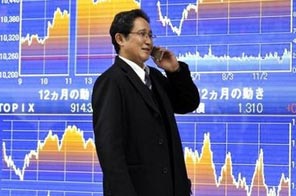Japan output rises, deflation threatens recovery
TOKYO: Japan's economy showed fresh signs of recovery Friday as factory output rose due to brisk demand from Asia, but a drop in consumer prices highlighted that deflation remains a key threat.
And Toyota Motor's safety defect crisis, which has damaged the reputation of the country's largest company, has also cast a shadow on the recovery, some analysts said.
Japan last year emerged from its worst post-war recession, growing in the second and third quarters due to rebounding exports, much of it to booming China, and on the back of government pump-priming measures at home.
As overseas demand for Japan's cars, electronics and other goods has picked up, the country's industrial output rose 2.5 percent in January from December, marking the 11th straight monthly gain, new figures showed.
The fresh data comes two days after the government said exports grew at the fastest pace for 30 years in January.
However, deflation was still burdening the economy, as core consumer prices fell 1.3 percent in January from a year earlier, marking the 11th straight month of decline, separate data showed Friday. The figure was in line with expectations.
"The fresh reading on factory output is a positive surprise, reflecting robust exports to Asia," said Taro Saito, economist at NLI Research Institute.
"The economy is on the right track to recovery," he said. "Declines in prices will eventually stop when the economy fully picks up."
But he said that the outlook has been clouded by Toyota's mass recalls of more than eight million vehicles worldwide.
"Looking ahead, Toyota's defects issue is a concern as it could weigh on exports to North America," he said.
Toyota has issued the recalls over defects related to complaints ranging from unintended acceleration to brake failure and steering problems.
Its president Akio Toyoda made a formal apology to angry US lawmakers and vowed to take safety "to the next level" during a meeting with the head of the US Department of Transportation on Thursday.
Japan's Finance Minister Naoto Kan said Friday the government had to do more to combat deflation, which cuts into corporate profits and leads consumers to delay purchases as they wait for further price drops.
"The CPI data show deflation is continuing. We need to do more to get out of it," he said after the figures were released.
Kan put further pressure on the Bank of Japan this week, telling it to play its part in fighting deflation, after the central bank kept its super-low interest rates unchanged last week.
The BoJ said in December it was a "critical challenge" for Asia's biggest economy to overcome deflation.
"I'd say what's important for the government is to draw up a firm growth strategy to help boost corporate profits" rather than putting pressure on the central bank or drafting another short-term stimulus package, said Ryota Sakagami, economist at Nomura Securities.
"Prices will not start rising until companies begin to have optimistic views about the business cycle, hiring more employees and raising wages," he said.
Sakagami agreed that Japan's surprisingly strong factory output is another sign of Japan's resilient recovery.
On the impact of Toyota's crisis, he said "if the reputation of Japanese made cars as a whole gets hurt, it could dampen exports to North America and slow the economic recovery, but so far I don't see such a scenario."






